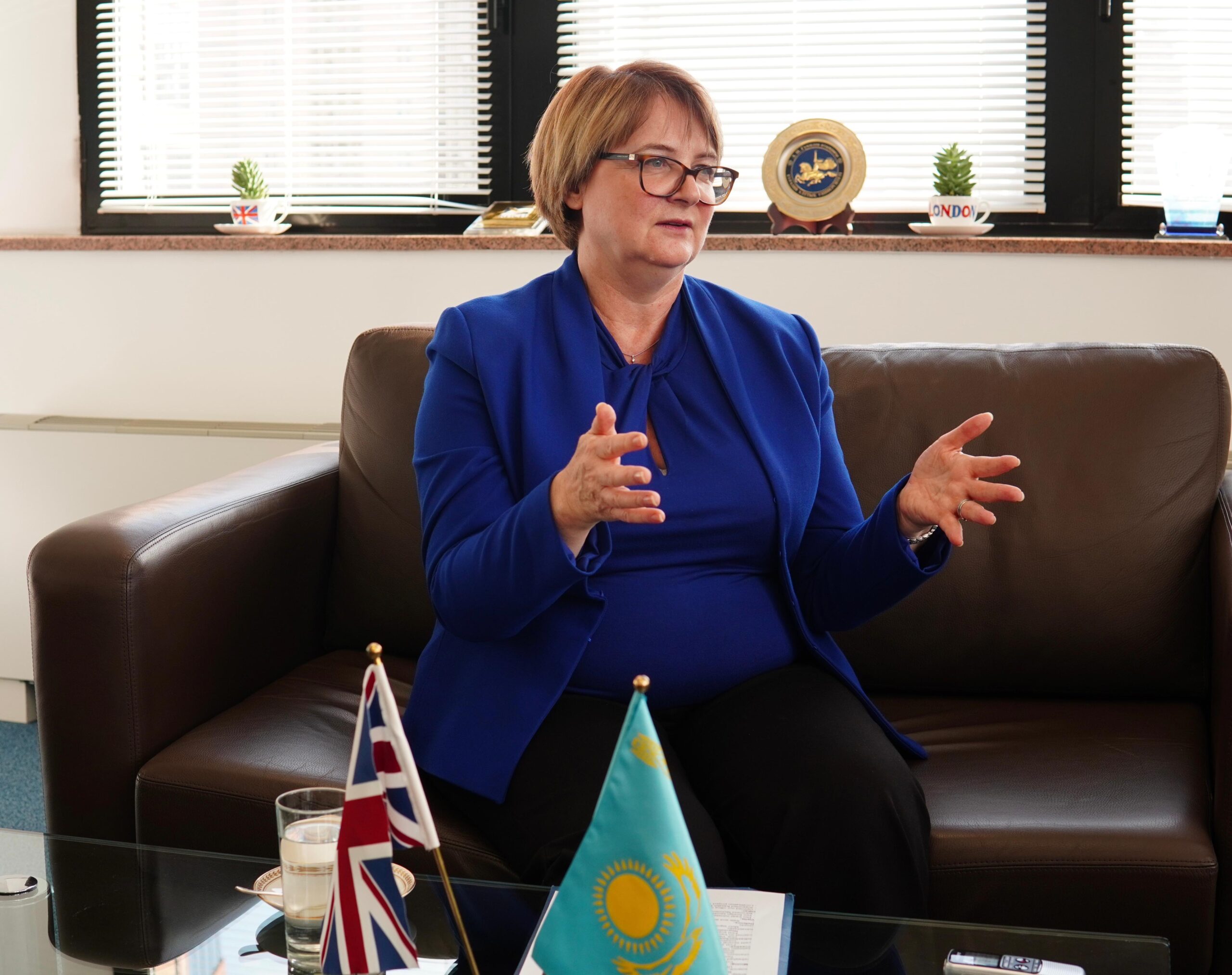ASTANA – As British Ambassador to Kazakhstan Kathy Leach concludes her four-year diplomatic mission, she reflects on the major strides made in bilateral relations, trade, infrastructure, and cultural diplomacy in a recent interview.
British Ambassador to Kazakhstan Kathy Leach. Photo credit: The Astana Times / Fatima Kemelova
Since her appointment in 2021, Leach has played a central role in reinvigorating the United Kingdom’s strategic presence in Central Asia with Kazakhstan at the heart of a dynamic and deepening partnership.
A new era of political engagement
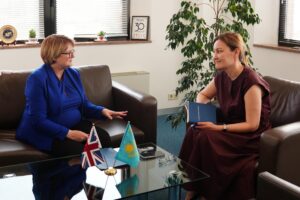
The Astana Times editor Zhanna Shayakhmetova and British Ambassador to Kazakhstan Kathy Leach during their conversation. Photo credit: The Astana Times/ Fatima Kemelova
“We successfully delivered two visits by the British foreign secretaries to Kazakhstan – a clear indication of renewed political engagement. James Cleverley’s visit underscored our bilateral priorities, while David Cameron’s broader Central Asia tour, which included all five regional countries and Mongolia, highlighted how Kazakhstan and the region as a whole have risen significantly on the U.K.’s foreign policy agenda,” said Leach.
Economic cooperation remains a core focus. The Ambassador emphasized the importance of supporting British businesses and identifying opportunities across key sectors such as education and innovation.
“Another big strand of what every diplomat does is business. We are here to support British business and look for win-win opportunities – deals that are good for British companies and also bring real value to Kazakhstan by introducing new products, skills, services, jobs or investment,” she added.
Building an academic bridge
A key area of success has been the rapid development of education cooperation. Since the 2021 opening of the first British university campus in Kazakhstan by De Montfort University, followed by those of Coventry and Cardiff universities, the U.K. has emerged as the leading partner in Kazakhstan’s ambitious plan to attract top international institutions.
“Wherever I go in Kazakhstan, I meet Bolashak scholars. There are nearly 6,000 who have studied in the U.K. The partnerships now go beyond campuses. They include deep academic collaboration, such as the London School of Economics and KBTU’s 20-year cooperation,” she said.
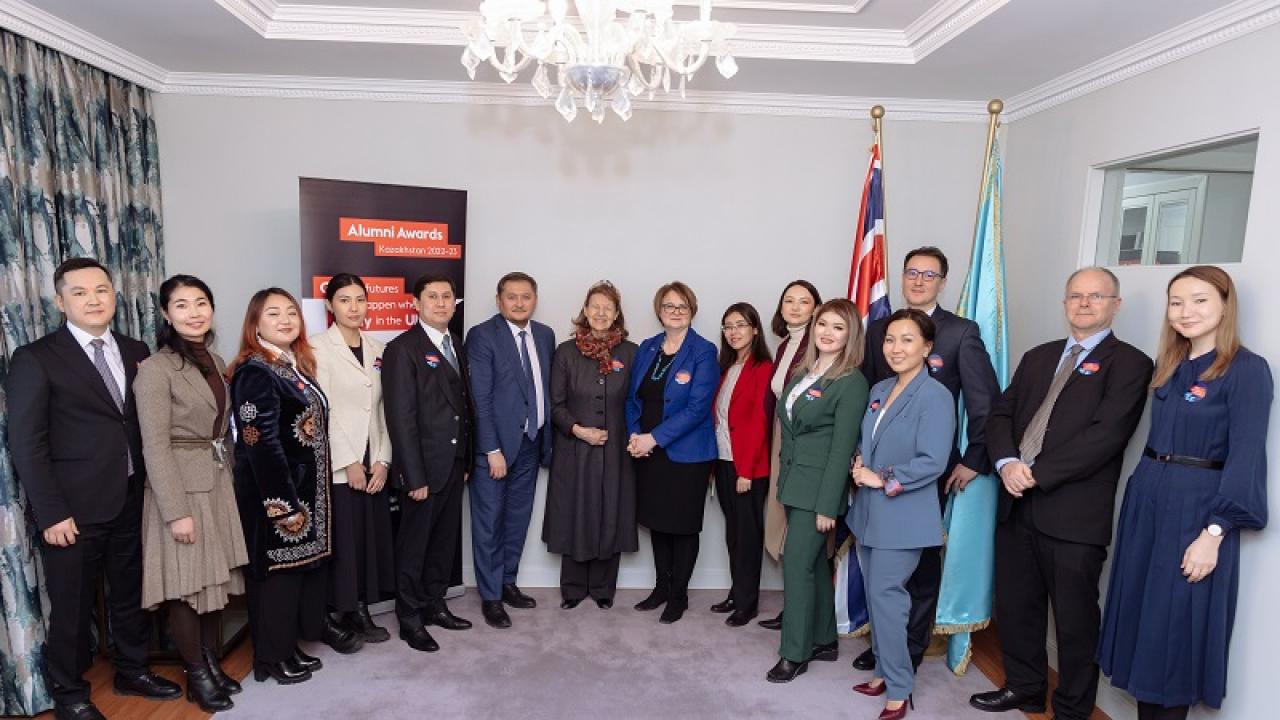
Kathy Leach and other special guests with finalists of the Study UK Alumni Awards 2022–23 at the Ceremony in Astana. Photo credit: kazakhstan.britishcouncil.org
This long-standing cooperation has yielded outstanding academic outcomes, with Kazakh students consistently performing at the top among their global peers.
“We certainly value the Kazakh students that come to us. I mentioned that a professor from the London School of Economics who has worked with KBTU for 20 years told me that among their 30 international partnerships, Kazakh students consistently perform at the very top. We want every student in Kazakhstan to have the opportunity to thrive at English-language universities or pursue a master’s abroad,” she added.
She emphasized that British universities are not only opening their doors to Kazakh students, but also co-developing programs tailored to Kazakhstan’s development goals with institutions like Heriot-Watt, Queen’s University Belfast and Ardingly College as part of a growing academic ecosystem.
Critical minerals and agriculture: building industrial ties
The Ambassador also pointed to the U.K.’s growing role in Kazakhstan’s industrial and agricultural development. The two countries have signed agreements on critical minerals, supporting British investment in rhenium and vanadium projects, and a bilateral roadmap guides cooperation in mining, research, and technology.
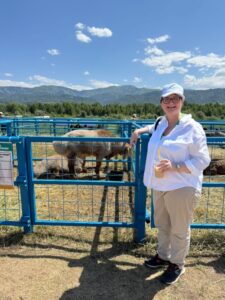
“Agriculture is a new but promising area of cooperation,” noted Leach about her visit to Lepsy. Photo credit: agrotrend.kz
“Critical minerals have become a major area of focus, and we are proud to support two key projects in rhenium and vanadium. The U.K. has long had a presence in mining and the broader supply chain, but this emerging interest in critical minerals has helped put Kazakhstan more prominently on the radar for British companies, academics and other partners. There’s been strong collaboration already, but we see real momentum now – and there’s much more we can do together,” she explained.
The nation’s growing partnership with the U.K. in the agricultural sector is not only advancing innovation but also supporting critical biodiversity goals. This year, the Altyn Dala Initiative won the Earthshot Prize for its work in restoring the steppe ecosystem and reviving the endangered Saiga antelope. It has been possible through two decades of collaboration with the Royal Society for the Protection of Birds. The long-term engagement reflects the broader potential of cooperation in agriculture, genetics and environmental sustainability.
Leach recently visited the agricultural exhibition in Lepsy, the Zhetisu Region, where British livestock genetics were on display.
“At the agricultural show in Lepsy, Zhetisu, I saw beautiful British breeds, Angus and Hereford cattle, on display. Agriculture is a relatively new area of cooperation, but one with significant potential. We are supporting efforts to introduce British genetics to Kazakhstan, as well as promoting technologies to improve water efficiency and sustainable farming practices,” she added.
Infrastructure and creative economy as new frontiers
Infrastructure has also emerged as a new focal point. An agreement with the Ministry of Water Resources has paved the way for British participation in major water infrastructure projects, including satellite connectivity and urban planning.
Leach championed the engagement in Kazakhstan’s cultural and architectural development. The Future Places architecture forum in Almaty brought together leading British firms, including Zaha Hadid Architects and Wilkinson Eyre, to explore collaboration opportunities in the new Alatau City.
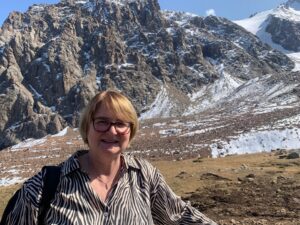
“It would be fantastic for tourists who want to go trekking in the mountains” she noted. Photo credit:Leach’s personal archive
Leach noted that British influence has long been visible in Kazakhstan’s urban landscape, with iconic projects such as Khan-Shatyr and the Palace of Peace and Reconciliation designed by British architect Norman Foster.
Leach believes that while Kazakhstan’s economy comprises many large state-owned enterprises and numerous small businesses, a crucial missing middle remains: medium-sized companies. This segment is vital for sustaining the country’s economic growth and enhancing its GDP.
Leach also expressed enthusiasm about sustainable tourism, a sector that is flourishing in many regions.
“Lepsy is a small village in the middle of the mountains. I was thinking this could be a perfect place for a yurt camp – a kind of low-impact, sustainable tourism project. It would be fantastic for tourists who want to go trekking in the mountains. This kind of mountain culture is developing well in Almaty,” she added.
Nurturing the next generation: creativity meets local culture
Leach observed a strong sense of creativity and confidence among the younger generation, particularly those involved in scholarship programs.
The blending of international ideas with local culture to foster innovation that truly fits Kazakhstan’s unique context.
“I spend a lot of time going to schools, universities and meeting Bolashak, Chevening, or John Smith fellows to see what they’re doing. I’m always really impressed by this upcoming generation, who are full of confidence and ideas. The important thing for Kazakhstan, thirty-plus years after independence, is to take good ideas from different places and then make them work here. Not every idea imported from the U.K. will work, especially in creative sectors, tourism or startups. It has to fit local culture and expectations. In Almaty, there’s always a fantastic creative vibe – a great street and artistic culture. Maybe we need more of that in Astana – more use of public spaces for cultural activities,” she said.
Building bonds: education and employment pathways
Leach noted a significant rise in visa applications from Kazakhstan to the U.K., reflecting growing connections between the two countries. She highlighted the variety of visas issued, including those for students, tourists and seasonal workers.
“Many were student visas, some of them – tourist, and about 5,000 were seasonal worker visas. This seasonal worker program is an interesting development – about 20,000 people from Central Asia come to the U.K. in the summer to work on farms. I hope it’s been a useful experience, giving people a chance to live, work, earn and save money. Then they can return home and maybe start their own businesses, using some of the ideas they’ve learned. It’s an important way Kazakhstan supports the British economy while also bringing back experience to develop the agricultural sector at home,” she explained.
Personal reflections: language, youth and hidden gems
Ambassador Leach, who dedicated several months to studying Kazakh before her arrival, shared personal reflections on her efforts to engage more deeply with local culture.
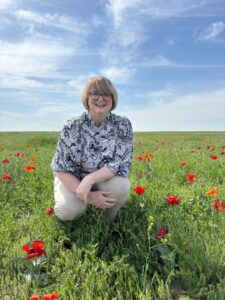
Leach among the poppies in southern Kazakhstan. Photo credit: Leach’s personal archive
“Language learning is like training for a marathon – it takes regular effort. I had the privilege of formal training before my posting and I continue to take weekly lessons. It’s hard, but immensely rewarding. For me, learning languages is like staying fit – you have to keep at it regularly. It’s important to find what works for you because everyone learns differently. Some people, like me, enjoy understanding grammar as the building blocks. Others might be great at jumping into conversations or picking things up by listening and watching TV. The key is to find your own method and make time for it. Over my life, I’ve learned French, a bit of German, Russian, Japanese, Armenian and Kazakh – which I think is a hard language. So, I hope fluent Kazakh speakers, who grew up in the language environment, will be kind and encouraging to those who are trying their best to learn it,” said Leach.
Asked to name her favorite destinations, Leach listed Bozzhyra in Mangystau, the Alatau Mountains in Zhetisu and East Kazakhstan’s Katon-Karagay as breathtaking natural wonders.
“You feel almost like something out of Star Wars, and it really should be much better advertised globally. That’s just one part of Mangystau – there are many other amazing sites I haven’t yet seen. Recently, I went to Lepsy and would add the Zhetisu, Alatau Mountains – it feels like Switzerland or Austria with its green valleys, flowers and snow-capped peaks. I was only dipping my toes in, driving to a village for an agricultural show, but it was incredible. Almaty itself is also great as a base for day trips to places like Charyn Canyon, Kolsay Lake, and Kaindy Lake – these are classics for a reason, with absolutely stunning landscapes. We also visited Altyn-Emel, which has tough roads; on the way back, we even had to be rescued after breaking down. Despite that, the landscape was amazing,” she explained.
As Leach completes her assignment in Kazakhstan, the focus remains on deepening partnerships, advancing shared priorities and fostering people-to-people ties that support the country’s long-term development.
